Research Project: Talent Management and HR in the Hospitality Sector
VerifiedAdded on 2023/01/13
|18
|3762
|48
Report
AI Summary
This research project investigates the impact of talent management on the role of HR within the hospitality sector, using Sheraton Hotel as a case study. The report includes a literature review on talent management concepts, its importance, and challenges in employee retention. The research methodology employed a qualitative approach, inductive reasoning, and interpretivism philosophy, with data collected through primary and secondary sources, including a questionnaire administered to 20 employees. The data analysis utilized thematic analysis, revealing key themes such as the company's awareness of talent management, HR's efforts in retaining talent, the use of employee interaction, and the effectiveness of rewards and strategies like performance appraisals, incentives, and promotions. The findings indicate a positive impact of talent management on employee productivity and highlight strategies for talent retention within the organization. The report concludes with recommendations for enhancing talent management practices within the hospitality sector.
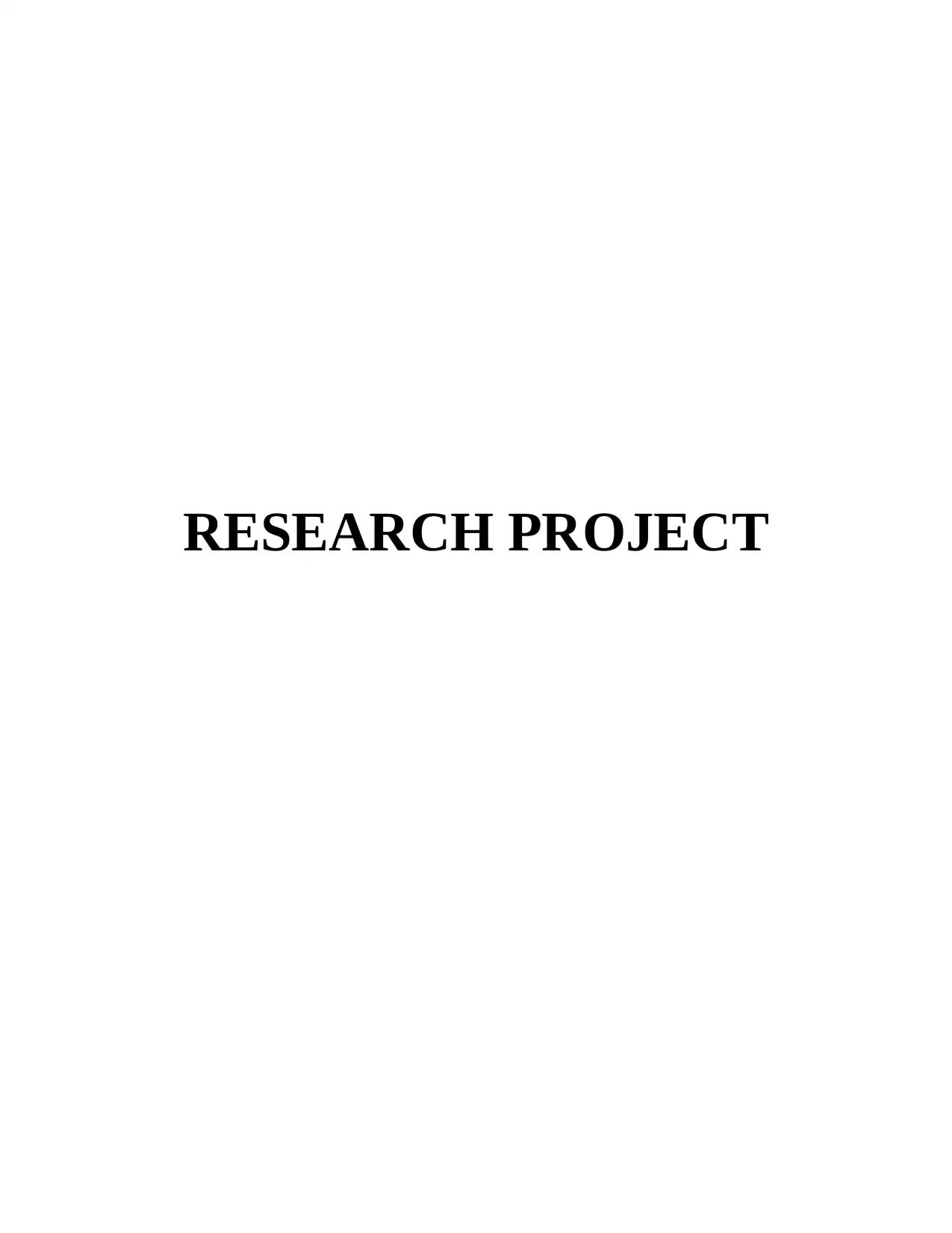
RESEARCH PROJECT
Paraphrase This Document
Need a fresh take? Get an instant paraphrase of this document with our AI Paraphraser
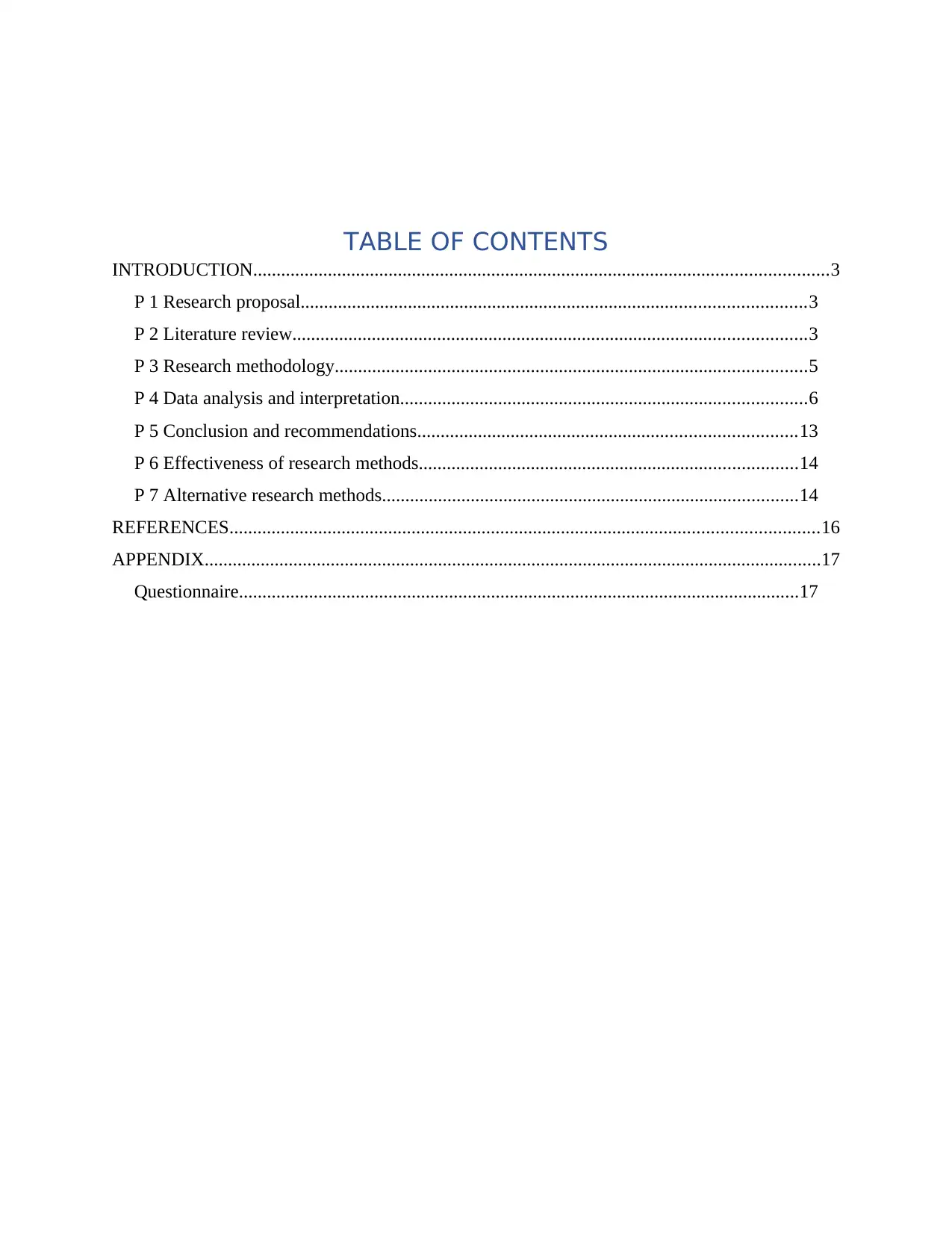
TABLE OF CONTENTS
INTRODUCTION...........................................................................................................................3
P 1 Research proposal............................................................................................................3
P 2 Literature review..............................................................................................................3
P 3 Research methodology.....................................................................................................5
P 4 Data analysis and interpretation.......................................................................................6
P 5 Conclusion and recommendations.................................................................................13
P 6 Effectiveness of research methods.................................................................................14
P 7 Alternative research methods.........................................................................................14
REFERENCES..............................................................................................................................16
APPENDIX....................................................................................................................................17
Questionnaire........................................................................................................................17
INTRODUCTION...........................................................................................................................3
P 1 Research proposal............................................................................................................3
P 2 Literature review..............................................................................................................3
P 3 Research methodology.....................................................................................................5
P 4 Data analysis and interpretation.......................................................................................6
P 5 Conclusion and recommendations.................................................................................13
P 6 Effectiveness of research methods.................................................................................14
P 7 Alternative research methods.........................................................................................14
REFERENCES..............................................................................................................................16
APPENDIX....................................................................................................................................17
Questionnaire........................................................................................................................17
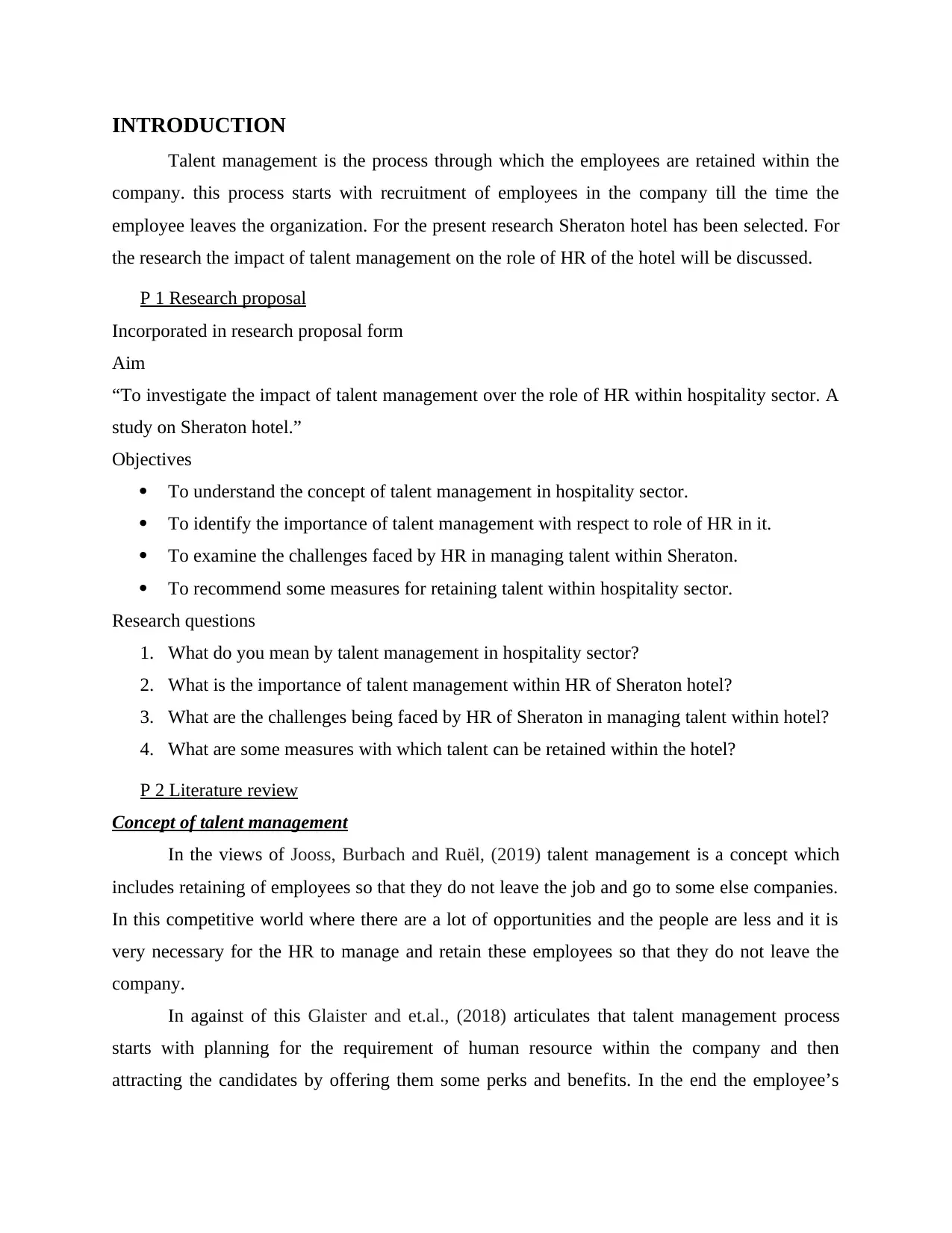
INTRODUCTION
Talent management is the process through which the employees are retained within the
company. this process starts with recruitment of employees in the company till the time the
employee leaves the organization. For the present research Sheraton hotel has been selected. For
the research the impact of talent management on the role of HR of the hotel will be discussed.
P 1 Research proposal
Incorporated in research proposal form
Aim
“To investigate the impact of talent management over the role of HR within hospitality sector. A
study on Sheraton hotel.”
Objectives
To understand the concept of talent management in hospitality sector.
To identify the importance of talent management with respect to role of HR in it.
To examine the challenges faced by HR in managing talent within Sheraton.
To recommend some measures for retaining talent within hospitality sector.
Research questions
1. What do you mean by talent management in hospitality sector?
2. What is the importance of talent management within HR of Sheraton hotel?
3. What are the challenges being faced by HR of Sheraton in managing talent within hotel?
4. What are some measures with which talent can be retained within the hotel?
P 2 Literature review
Concept of talent management
In the views of Jooss, Burbach and Ruël, (2019) talent management is a concept which
includes retaining of employees so that they do not leave the job and go to some else companies.
In this competitive world where there are a lot of opportunities and the people are less and it is
very necessary for the HR to manage and retain these employees so that they do not leave the
company.
In against of this Glaister and et.al., (2018) articulates that talent management process
starts with planning for the requirement of human resource within the company and then
attracting the candidates by offering them some perks and benefits. In the end the employee’s
Talent management is the process through which the employees are retained within the
company. this process starts with recruitment of employees in the company till the time the
employee leaves the organization. For the present research Sheraton hotel has been selected. For
the research the impact of talent management on the role of HR of the hotel will be discussed.
P 1 Research proposal
Incorporated in research proposal form
Aim
“To investigate the impact of talent management over the role of HR within hospitality sector. A
study on Sheraton hotel.”
Objectives
To understand the concept of talent management in hospitality sector.
To identify the importance of talent management with respect to role of HR in it.
To examine the challenges faced by HR in managing talent within Sheraton.
To recommend some measures for retaining talent within hospitality sector.
Research questions
1. What do you mean by talent management in hospitality sector?
2. What is the importance of talent management within HR of Sheraton hotel?
3. What are the challenges being faced by HR of Sheraton in managing talent within hotel?
4. What are some measures with which talent can be retained within the hotel?
P 2 Literature review
Concept of talent management
In the views of Jooss, Burbach and Ruël, (2019) talent management is a concept which
includes retaining of employees so that they do not leave the job and go to some else companies.
In this competitive world where there are a lot of opportunities and the people are less and it is
very necessary for the HR to manage and retain these employees so that they do not leave the
company.
In against of this Glaister and et.al., (2018) articulates that talent management process
starts with planning for the requirement of human resource within the company and then
attracting the candidates by offering them some perks and benefits. In the end the employee’s
⊘ This is a preview!⊘
Do you want full access?
Subscribe today to unlock all pages.

Trusted by 1+ million students worldwide
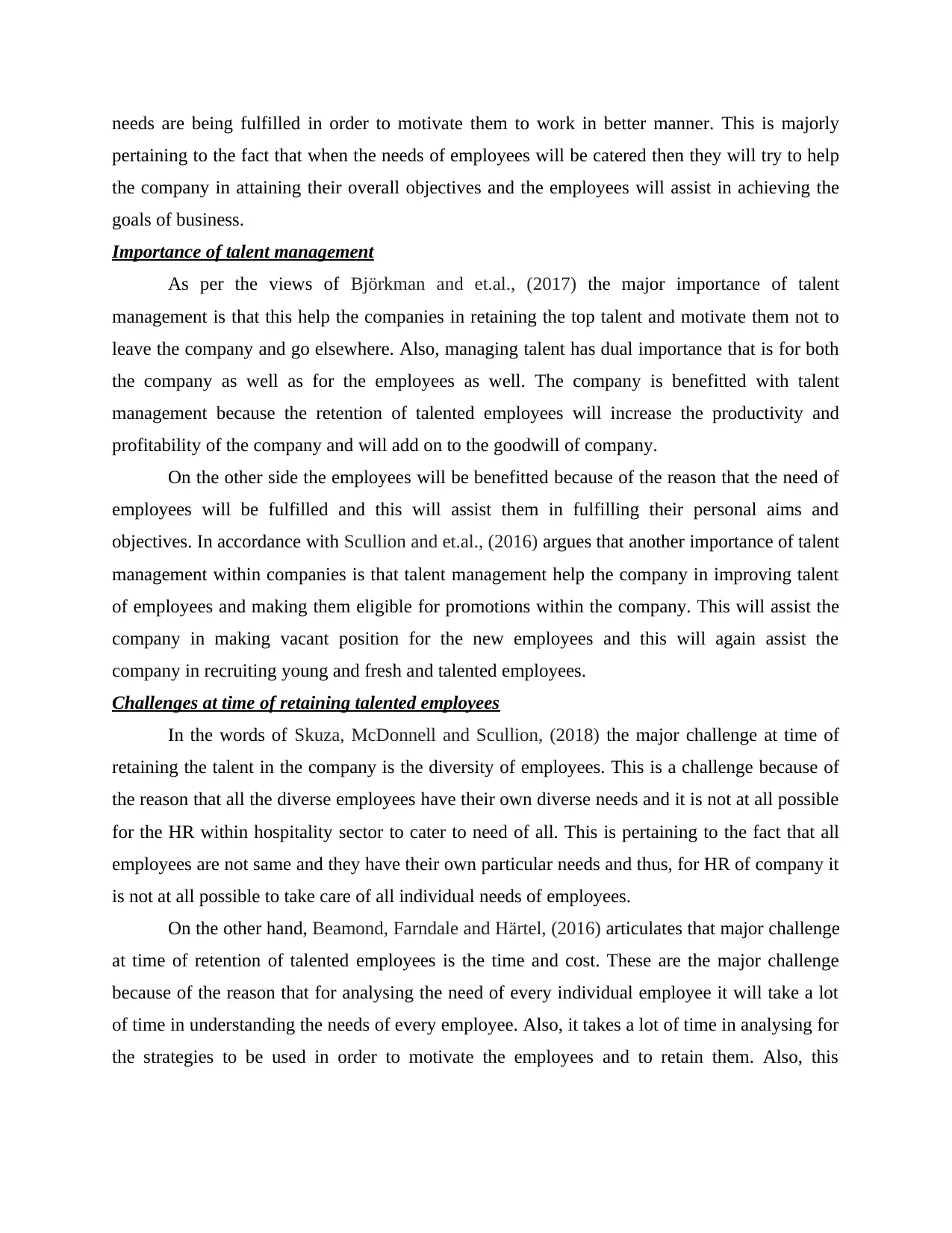
needs are being fulfilled in order to motivate them to work in better manner. This is majorly
pertaining to the fact that when the needs of employees will be catered then they will try to help
the company in attaining their overall objectives and the employees will assist in achieving the
goals of business.
Importance of talent management
As per the views of Björkman and et.al., (2017) the major importance of talent
management is that this help the companies in retaining the top talent and motivate them not to
leave the company and go elsewhere. Also, managing talent has dual importance that is for both
the company as well as for the employees as well. The company is benefitted with talent
management because the retention of talented employees will increase the productivity and
profitability of the company and will add on to the goodwill of company.
On the other side the employees will be benefitted because of the reason that the need of
employees will be fulfilled and this will assist them in fulfilling their personal aims and
objectives. In accordance with Scullion and et.al., (2016) argues that another importance of talent
management within companies is that talent management help the company in improving talent
of employees and making them eligible for promotions within the company. This will assist the
company in making vacant position for the new employees and this will again assist the
company in recruiting young and fresh and talented employees.
Challenges at time of retaining talented employees
In the words of Skuza, McDonnell and Scullion, (2018) the major challenge at time of
retaining the talent in the company is the diversity of employees. This is a challenge because of
the reason that all the diverse employees have their own diverse needs and it is not at all possible
for the HR within hospitality sector to cater to need of all. This is pertaining to the fact that all
employees are not same and they have their own particular needs and thus, for HR of company it
is not at all possible to take care of all individual needs of employees.
On the other hand, Beamond, Farndale and Härtel, (2016) articulates that major challenge
at time of retention of talented employees is the time and cost. These are the major challenge
because of the reason that for analysing the need of every individual employee it will take a lot
of time in understanding the needs of every employee. Also, it takes a lot of time in analysing for
the strategies to be used in order to motivate the employees and to retain them. Also, this
pertaining to the fact that when the needs of employees will be catered then they will try to help
the company in attaining their overall objectives and the employees will assist in achieving the
goals of business.
Importance of talent management
As per the views of Björkman and et.al., (2017) the major importance of talent
management is that this help the companies in retaining the top talent and motivate them not to
leave the company and go elsewhere. Also, managing talent has dual importance that is for both
the company as well as for the employees as well. The company is benefitted with talent
management because the retention of talented employees will increase the productivity and
profitability of the company and will add on to the goodwill of company.
On the other side the employees will be benefitted because of the reason that the need of
employees will be fulfilled and this will assist them in fulfilling their personal aims and
objectives. In accordance with Scullion and et.al., (2016) argues that another importance of talent
management within companies is that talent management help the company in improving talent
of employees and making them eligible for promotions within the company. This will assist the
company in making vacant position for the new employees and this will again assist the
company in recruiting young and fresh and talented employees.
Challenges at time of retaining talented employees
In the words of Skuza, McDonnell and Scullion, (2018) the major challenge at time of
retaining the talent in the company is the diversity of employees. This is a challenge because of
the reason that all the diverse employees have their own diverse needs and it is not at all possible
for the HR within hospitality sector to cater to need of all. This is pertaining to the fact that all
employees are not same and they have their own particular needs and thus, for HR of company it
is not at all possible to take care of all individual needs of employees.
On the other hand, Beamond, Farndale and Härtel, (2016) articulates that major challenge
at time of retention of talented employees is the time and cost. These are the major challenge
because of the reason that for analysing the need of every individual employee it will take a lot
of time in understanding the needs of every employee. Also, it takes a lot of time in analysing for
the strategies to be used in order to motivate the employees and to retain them. Also, this
Paraphrase This Document
Need a fresh take? Get an instant paraphrase of this document with our AI Paraphraser
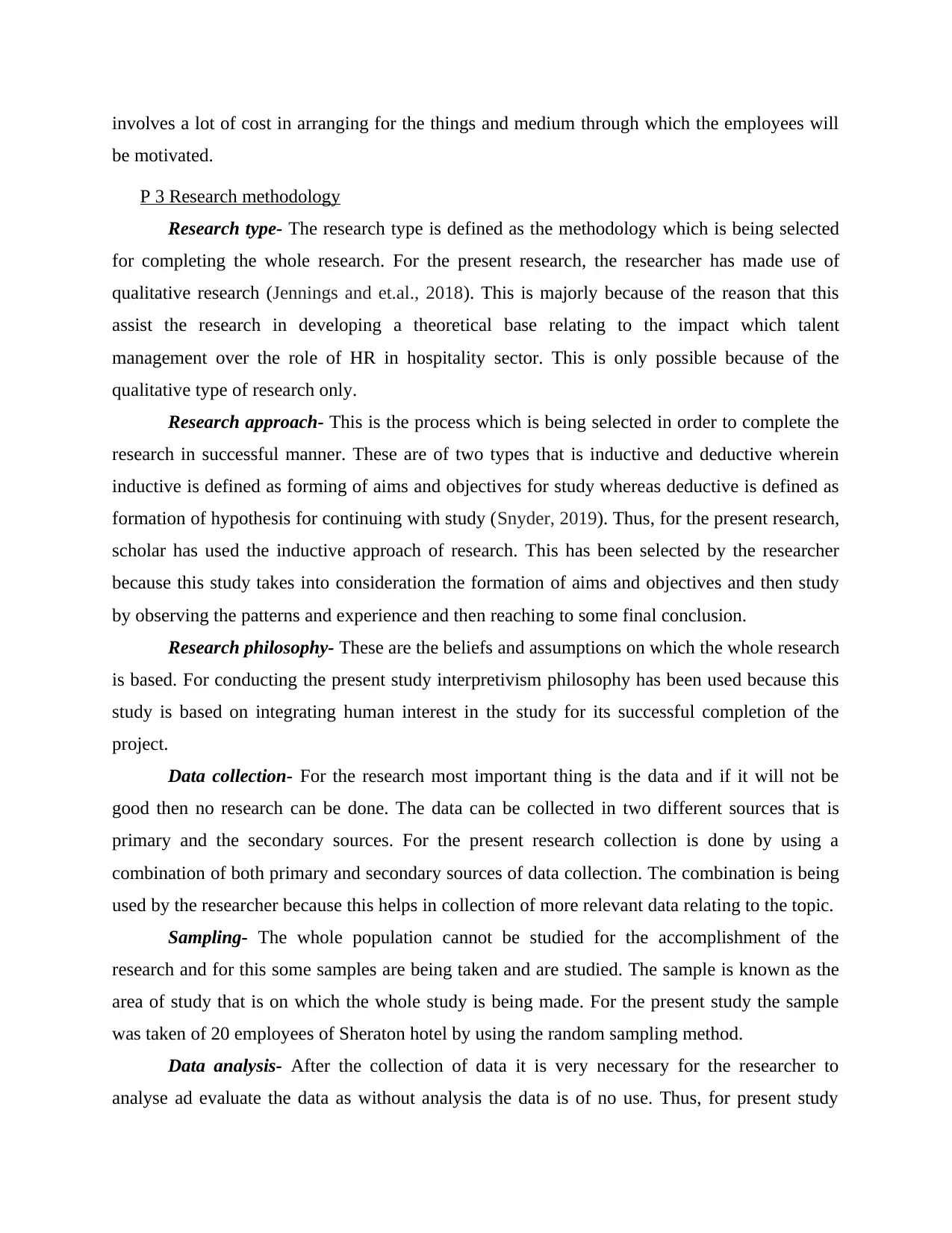
involves a lot of cost in arranging for the things and medium through which the employees will
be motivated.
P 3 Research methodology
Research type- The research type is defined as the methodology which is being selected
for completing the whole research. For the present research, the researcher has made use of
qualitative research (Jennings and et.al., 2018). This is majorly because of the reason that this
assist the research in developing a theoretical base relating to the impact which talent
management over the role of HR in hospitality sector. This is only possible because of the
qualitative type of research only.
Research approach- This is the process which is being selected in order to complete the
research in successful manner. These are of two types that is inductive and deductive wherein
inductive is defined as forming of aims and objectives for study whereas deductive is defined as
formation of hypothesis for continuing with study (Snyder, 2019). Thus, for the present research,
scholar has used the inductive approach of research. This has been selected by the researcher
because this study takes into consideration the formation of aims and objectives and then study
by observing the patterns and experience and then reaching to some final conclusion.
Research philosophy- These are the beliefs and assumptions on which the whole research
is based. For conducting the present study interpretivism philosophy has been used because this
study is based on integrating human interest in the study for its successful completion of the
project.
Data collection- For the research most important thing is the data and if it will not be
good then no research can be done. The data can be collected in two different sources that is
primary and the secondary sources. For the present research collection is done by using a
combination of both primary and secondary sources of data collection. The combination is being
used by the researcher because this helps in collection of more relevant data relating to the topic.
Sampling- The whole population cannot be studied for the accomplishment of the
research and for this some samples are being taken and are studied. The sample is known as the
area of study that is on which the whole study is being made. For the present study the sample
was taken of 20 employees of Sheraton hotel by using the random sampling method.
Data analysis- After the collection of data it is very necessary for the researcher to
analyse ad evaluate the data as without analysis the data is of no use. Thus, for present study
be motivated.
P 3 Research methodology
Research type- The research type is defined as the methodology which is being selected
for completing the whole research. For the present research, the researcher has made use of
qualitative research (Jennings and et.al., 2018). This is majorly because of the reason that this
assist the research in developing a theoretical base relating to the impact which talent
management over the role of HR in hospitality sector. This is only possible because of the
qualitative type of research only.
Research approach- This is the process which is being selected in order to complete the
research in successful manner. These are of two types that is inductive and deductive wherein
inductive is defined as forming of aims and objectives for study whereas deductive is defined as
formation of hypothesis for continuing with study (Snyder, 2019). Thus, for the present research,
scholar has used the inductive approach of research. This has been selected by the researcher
because this study takes into consideration the formation of aims and objectives and then study
by observing the patterns and experience and then reaching to some final conclusion.
Research philosophy- These are the beliefs and assumptions on which the whole research
is based. For conducting the present study interpretivism philosophy has been used because this
study is based on integrating human interest in the study for its successful completion of the
project.
Data collection- For the research most important thing is the data and if it will not be
good then no research can be done. The data can be collected in two different sources that is
primary and the secondary sources. For the present research collection is done by using a
combination of both primary and secondary sources of data collection. The combination is being
used by the researcher because this helps in collection of more relevant data relating to the topic.
Sampling- The whole population cannot be studied for the accomplishment of the
research and for this some samples are being taken and are studied. The sample is known as the
area of study that is on which the whole study is being made. For the present study the sample
was taken of 20 employees of Sheraton hotel by using the random sampling method.
Data analysis- After the collection of data it is very necessary for the researcher to
analyse ad evaluate the data as without analysis the data is of no use. Thus, for present study
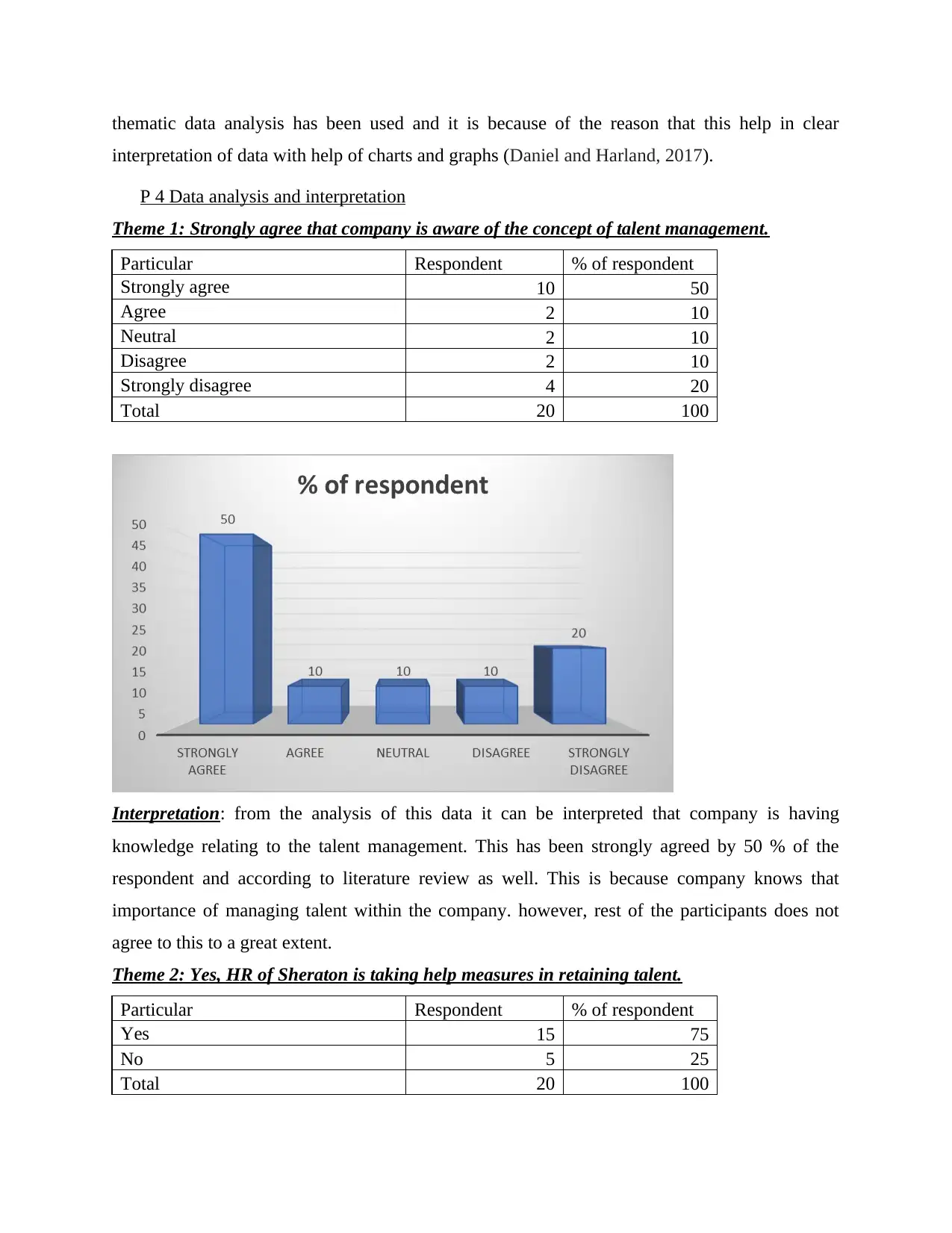
thematic data analysis has been used and it is because of the reason that this help in clear
interpretation of data with help of charts and graphs (Daniel and Harland, 2017).
P 4 Data analysis and interpretation
Theme 1: Strongly agree that company is aware of the concept of talent management.
Particular Respondent % of respondent
Strongly agree 10 50
Agree 2 10
Neutral 2 10
Disagree 2 10
Strongly disagree 4 20
Total 20 100
Interpretation: from the analysis of this data it can be interpreted that company is having
knowledge relating to the talent management. This has been strongly agreed by 50 % of the
respondent and according to literature review as well. This is because company knows that
importance of managing talent within the company. however, rest of the participants does not
agree to this to a great extent.
Theme 2: Yes, HR of Sheraton is taking help measures in retaining talent.
Particular Respondent % of respondent
Yes 15 75
No 5 25
Total 20 100
interpretation of data with help of charts and graphs (Daniel and Harland, 2017).
P 4 Data analysis and interpretation
Theme 1: Strongly agree that company is aware of the concept of talent management.
Particular Respondent % of respondent
Strongly agree 10 50
Agree 2 10
Neutral 2 10
Disagree 2 10
Strongly disagree 4 20
Total 20 100
Interpretation: from the analysis of this data it can be interpreted that company is having
knowledge relating to the talent management. This has been strongly agreed by 50 % of the
respondent and according to literature review as well. This is because company knows that
importance of managing talent within the company. however, rest of the participants does not
agree to this to a great extent.
Theme 2: Yes, HR of Sheraton is taking help measures in retaining talent.
Particular Respondent % of respondent
Yes 15 75
No 5 25
Total 20 100
⊘ This is a preview!⊘
Do you want full access?
Subscribe today to unlock all pages.

Trusted by 1+ million students worldwide
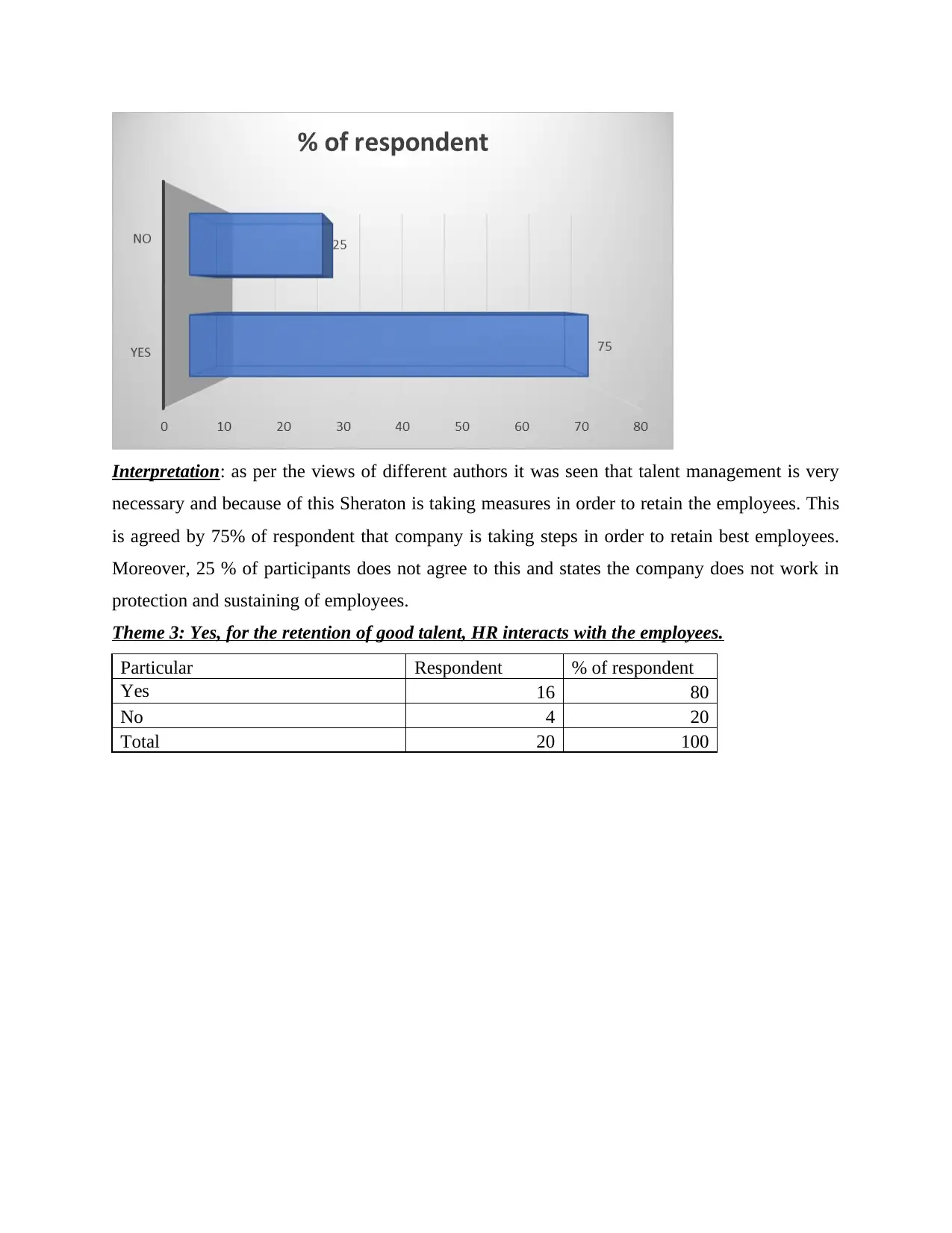
Interpretation: as per the views of different authors it was seen that talent management is very
necessary and because of this Sheraton is taking measures in order to retain the employees. This
is agreed by 75% of respondent that company is taking steps in order to retain best employees.
Moreover, 25 % of participants does not agree to this and states the company does not work in
protection and sustaining of employees.
Theme 3: Yes, for the retention of good talent, HR interacts with the employees.
Particular Respondent % of respondent
Yes 16 80
No 4 20
Total 20 100
necessary and because of this Sheraton is taking measures in order to retain the employees. This
is agreed by 75% of respondent that company is taking steps in order to retain best employees.
Moreover, 25 % of participants does not agree to this and states the company does not work in
protection and sustaining of employees.
Theme 3: Yes, for the retention of good talent, HR interacts with the employees.
Particular Respondent % of respondent
Yes 16 80
No 4 20
Total 20 100
Paraphrase This Document
Need a fresh take? Get an instant paraphrase of this document with our AI Paraphraser
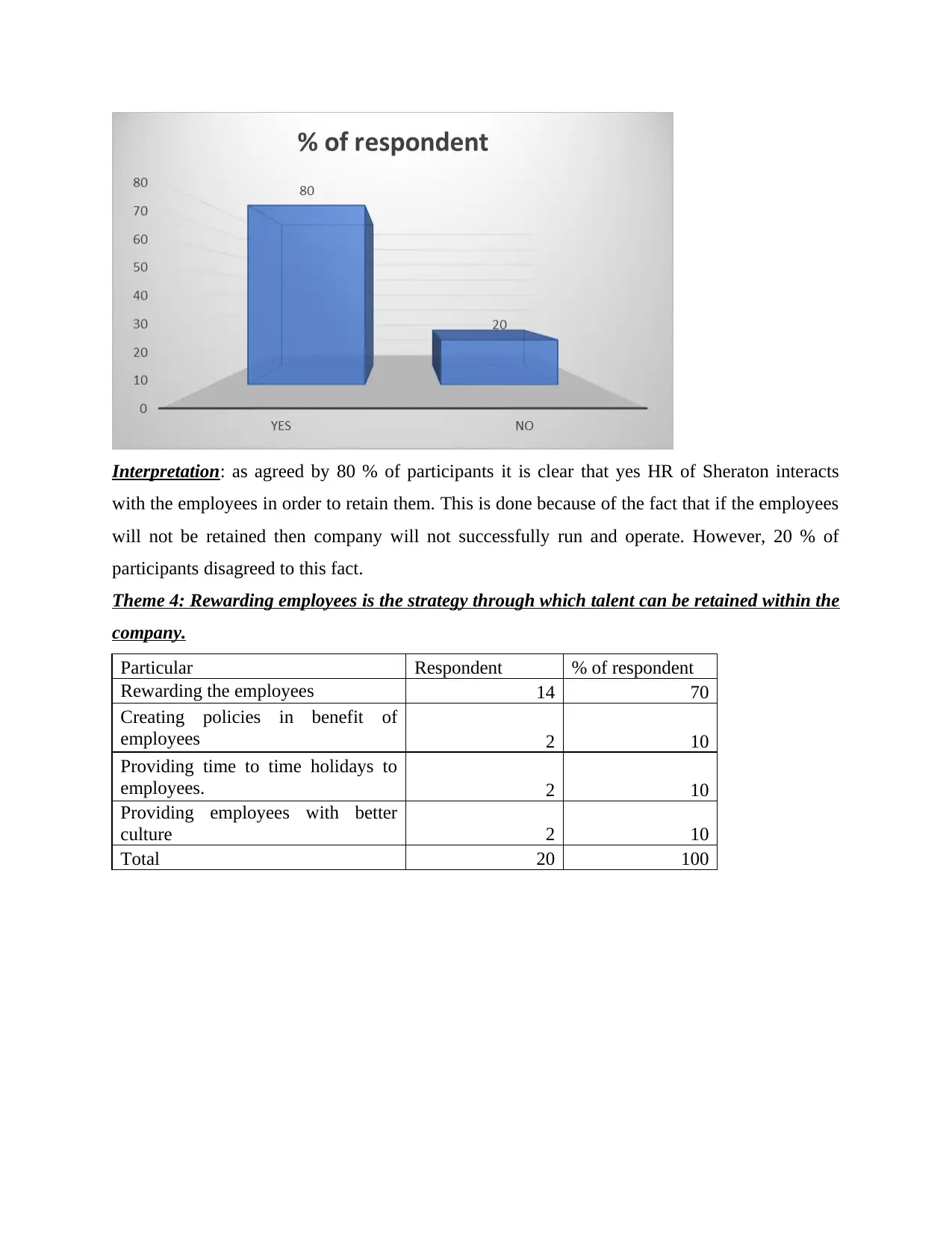
Interpretation: as agreed by 80 % of participants it is clear that yes HR of Sheraton interacts
with the employees in order to retain them. This is done because of the fact that if the employees
will not be retained then company will not successfully run and operate. However, 20 % of
participants disagreed to this fact.
Theme 4: Rewarding employees is the strategy through which talent can be retained within the
company.
Particular Respondent % of respondent
Rewarding the employees 14 70
Creating policies in benefit of
employees 2 10
Providing time to time holidays to
employees. 2 10
Providing employees with better
culture 2 10
Total 20 100
with the employees in order to retain them. This is done because of the fact that if the employees
will not be retained then company will not successfully run and operate. However, 20 % of
participants disagreed to this fact.
Theme 4: Rewarding employees is the strategy through which talent can be retained within the
company.
Particular Respondent % of respondent
Rewarding the employees 14 70
Creating policies in benefit of
employees 2 10
Providing time to time holidays to
employees. 2 10
Providing employees with better
culture 2 10
Total 20 100
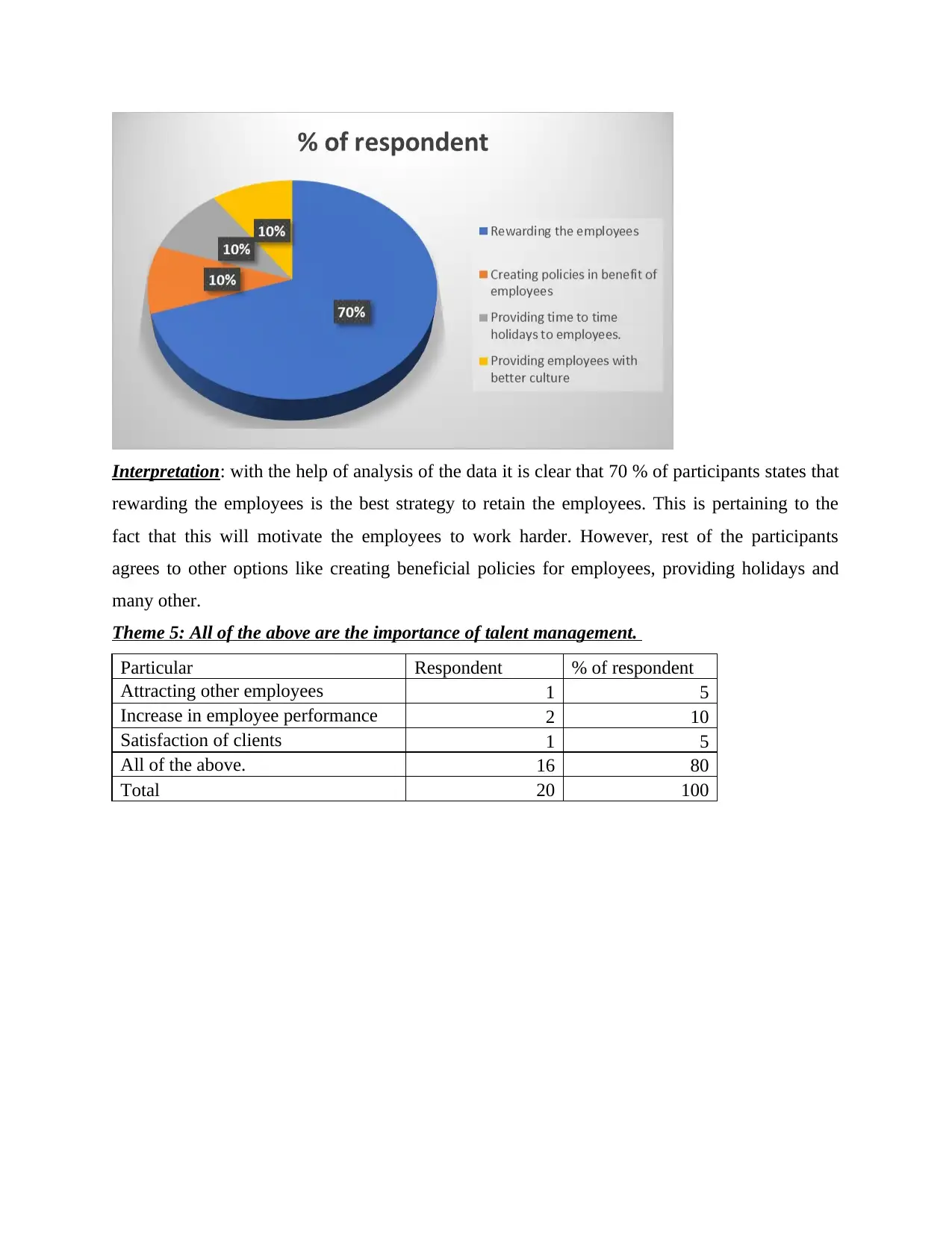
Interpretation: with the help of analysis of the data it is clear that 70 % of participants states that
rewarding the employees is the best strategy to retain the employees. This is pertaining to the
fact that this will motivate the employees to work harder. However, rest of the participants
agrees to other options like creating beneficial policies for employees, providing holidays and
many other.
Theme 5: All of the above are the importance of talent management.
Particular Respondent % of respondent
Attracting other employees 1 5
Increase in employee performance 2 10
Satisfaction of clients 1 5
All of the above. 16 80
Total 20 100
rewarding the employees is the best strategy to retain the employees. This is pertaining to the
fact that this will motivate the employees to work harder. However, rest of the participants
agrees to other options like creating beneficial policies for employees, providing holidays and
many other.
Theme 5: All of the above are the importance of talent management.
Particular Respondent % of respondent
Attracting other employees 1 5
Increase in employee performance 2 10
Satisfaction of clients 1 5
All of the above. 16 80
Total 20 100
⊘ This is a preview!⊘
Do you want full access?
Subscribe today to unlock all pages.

Trusted by 1+ million students worldwide
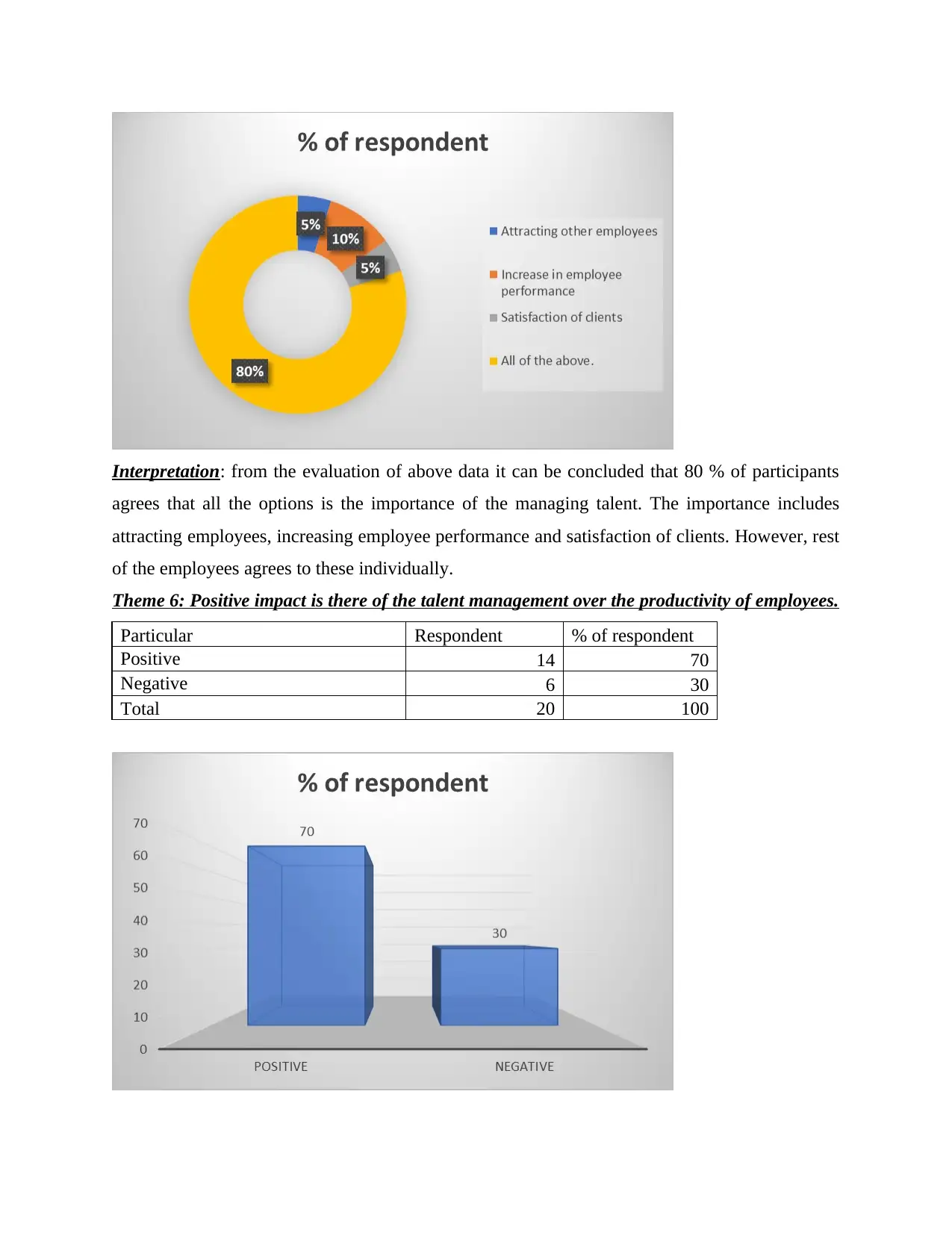
Interpretation: from the evaluation of above data it can be concluded that 80 % of participants
agrees that all the options is the importance of the managing talent. The importance includes
attracting employees, increasing employee performance and satisfaction of clients. However, rest
of the employees agrees to these individually.
Theme 6: Positive impact is there of the talent management over the productivity of employees.
Particular Respondent % of respondent
Positive 14 70
Negative 6 30
Total 20 100
agrees that all the options is the importance of the managing talent. The importance includes
attracting employees, increasing employee performance and satisfaction of clients. However, rest
of the employees agrees to these individually.
Theme 6: Positive impact is there of the talent management over the productivity of employees.
Particular Respondent % of respondent
Positive 14 70
Negative 6 30
Total 20 100
Paraphrase This Document
Need a fresh take? Get an instant paraphrase of this document with our AI Paraphraser
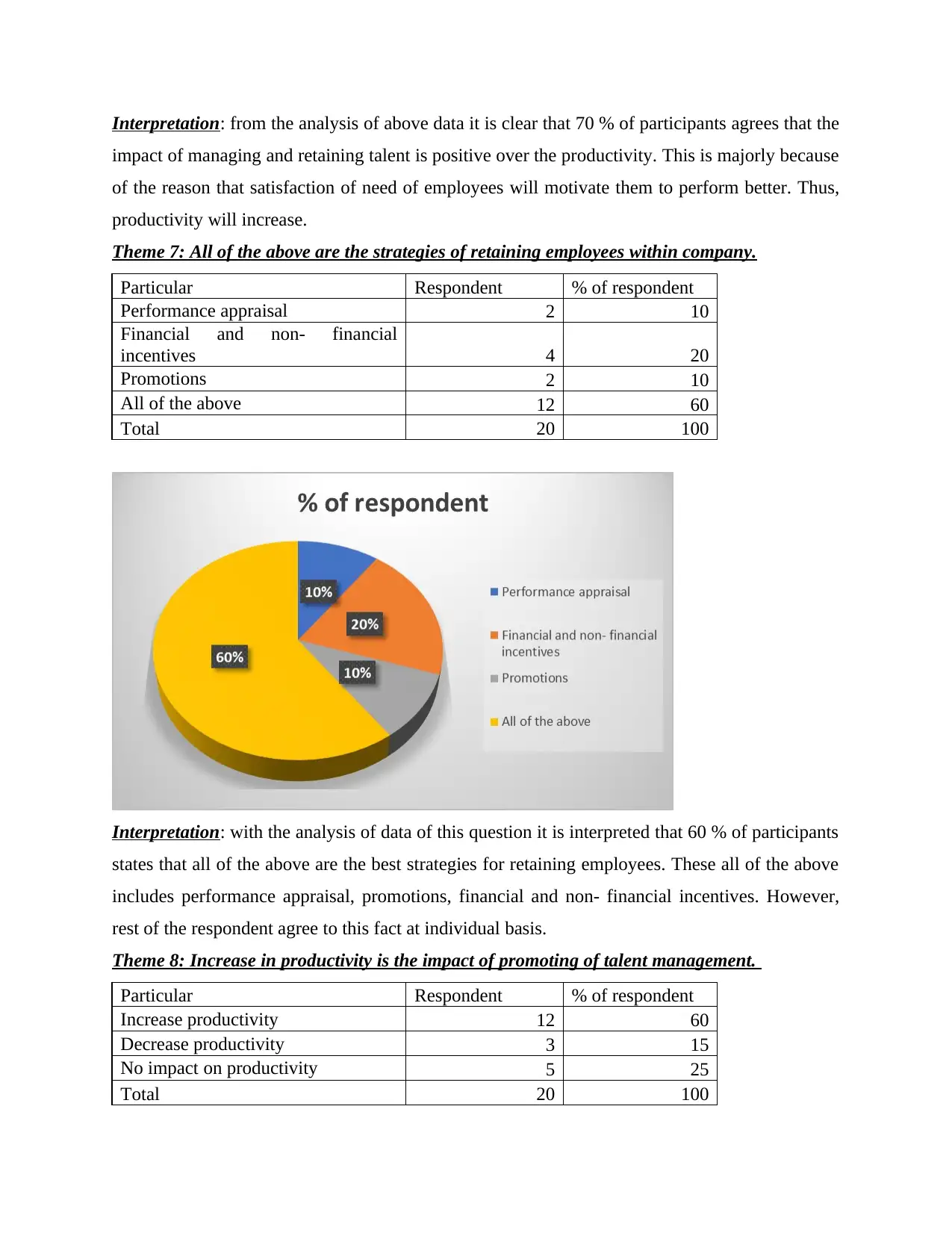
Interpretation: from the analysis of above data it is clear that 70 % of participants agrees that the
impact of managing and retaining talent is positive over the productivity. This is majorly because
of the reason that satisfaction of need of employees will motivate them to perform better. Thus,
productivity will increase.
Theme 7: All of the above are the strategies of retaining employees within company.
Particular Respondent % of respondent
Performance appraisal 2 10
Financial and non- financial
incentives 4 20
Promotions 2 10
All of the above 12 60
Total 20 100
Interpretation: with the analysis of data of this question it is interpreted that 60 % of participants
states that all of the above are the best strategies for retaining employees. These all of the above
includes performance appraisal, promotions, financial and non- financial incentives. However,
rest of the respondent agree to this fact at individual basis.
Theme 8: Increase in productivity is the impact of promoting of talent management.
Particular Respondent % of respondent
Increase productivity 12 60
Decrease productivity 3 15
No impact on productivity 5 25
Total 20 100
impact of managing and retaining talent is positive over the productivity. This is majorly because
of the reason that satisfaction of need of employees will motivate them to perform better. Thus,
productivity will increase.
Theme 7: All of the above are the strategies of retaining employees within company.
Particular Respondent % of respondent
Performance appraisal 2 10
Financial and non- financial
incentives 4 20
Promotions 2 10
All of the above 12 60
Total 20 100
Interpretation: with the analysis of data of this question it is interpreted that 60 % of participants
states that all of the above are the best strategies for retaining employees. These all of the above
includes performance appraisal, promotions, financial and non- financial incentives. However,
rest of the respondent agree to this fact at individual basis.
Theme 8: Increase in productivity is the impact of promoting of talent management.
Particular Respondent % of respondent
Increase productivity 12 60
Decrease productivity 3 15
No impact on productivity 5 25
Total 20 100
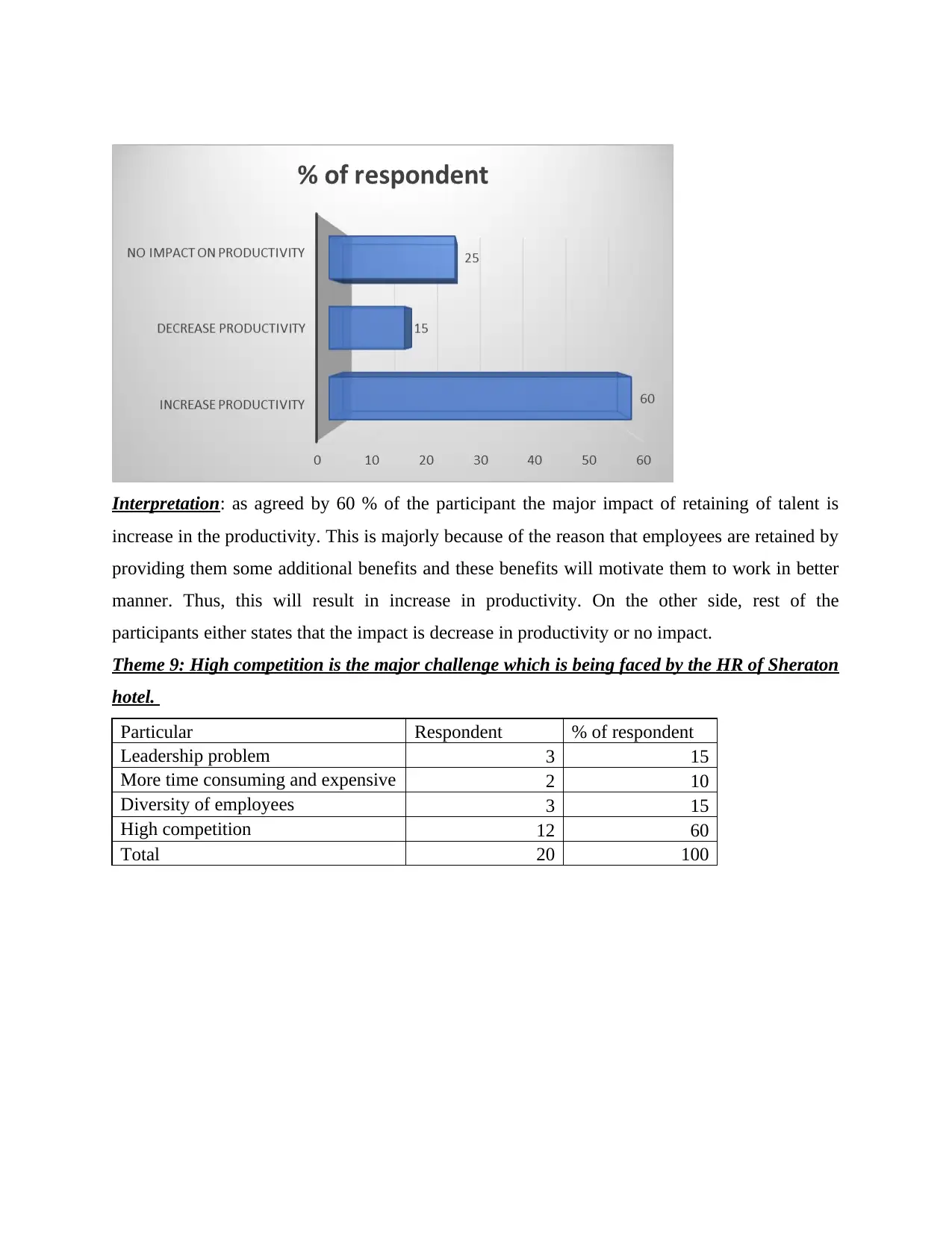
Interpretation: as agreed by 60 % of the participant the major impact of retaining of talent is
increase in the productivity. This is majorly because of the reason that employees are retained by
providing them some additional benefits and these benefits will motivate them to work in better
manner. Thus, this will result in increase in productivity. On the other side, rest of the
participants either states that the impact is decrease in productivity or no impact.
Theme 9: High competition is the major challenge which is being faced by the HR of Sheraton
hotel.
Particular Respondent % of respondent
Leadership problem 3 15
More time consuming and expensive 2 10
Diversity of employees 3 15
High competition 12 60
Total 20 100
increase in the productivity. This is majorly because of the reason that employees are retained by
providing them some additional benefits and these benefits will motivate them to work in better
manner. Thus, this will result in increase in productivity. On the other side, rest of the
participants either states that the impact is decrease in productivity or no impact.
Theme 9: High competition is the major challenge which is being faced by the HR of Sheraton
hotel.
Particular Respondent % of respondent
Leadership problem 3 15
More time consuming and expensive 2 10
Diversity of employees 3 15
High competition 12 60
Total 20 100
⊘ This is a preview!⊘
Do you want full access?
Subscribe today to unlock all pages.

Trusted by 1+ million students worldwide
1 out of 18
Related Documents
Your All-in-One AI-Powered Toolkit for Academic Success.
+13062052269
info@desklib.com
Available 24*7 on WhatsApp / Email
![[object Object]](/_next/static/media/star-bottom.7253800d.svg)
Unlock your academic potential
Copyright © 2020–2026 A2Z Services. All Rights Reserved. Developed and managed by ZUCOL.





